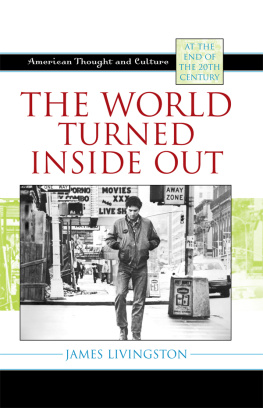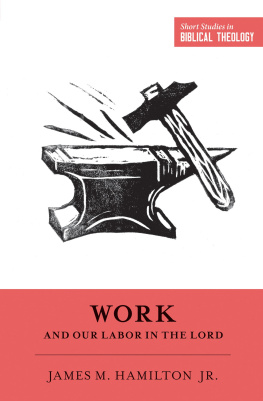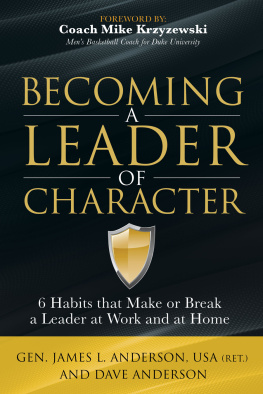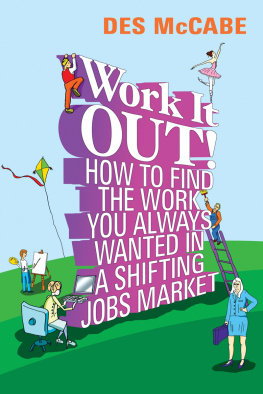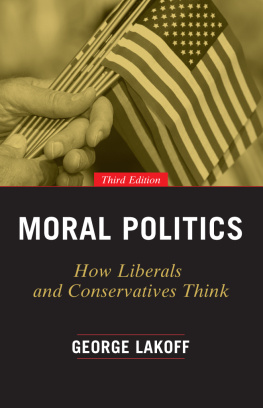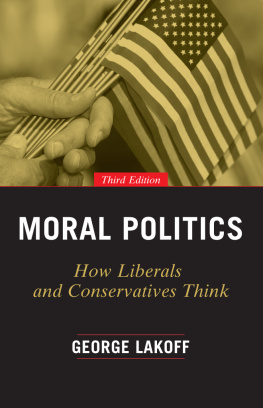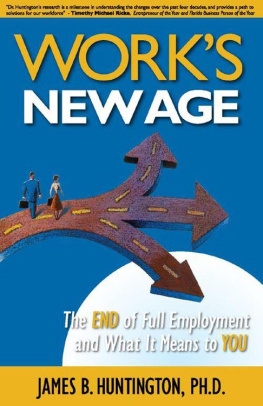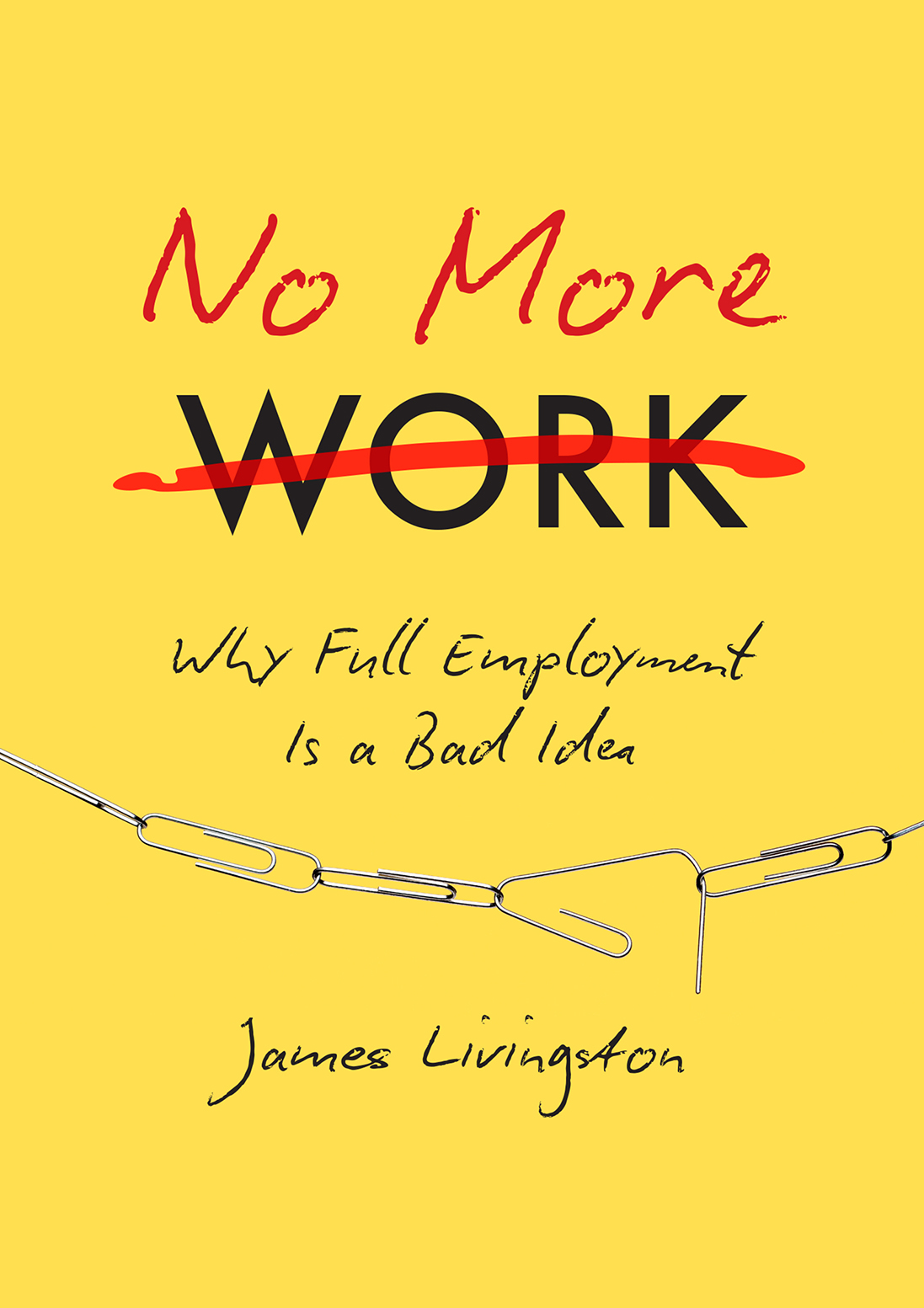
Contents
No More Work
This book was published with the assistance of the Anniversary Fund of the University of North Carolina Press.
2016 James Livingston
All rights reserved
Designed and set by Jamison Cockerham
Set in Scala, designed by Martin Majoor
Jacket illustration: Horizontal Breaking Paperclip Chain on Yellow, Vince Clements/Shutterstock.com.
Manufactured in the United States of America
The University of North Carolina Press has been a member of the Green Press Initiative since 2003.
LIBRARY OF CONGRESS CATALOGING-IN-PUBLICATION DATA
Names: Livingston, James, 1949
Title: No more work : why full employment is a bad idea / James Livingston.
Description: Chapel Hill: The University of North Carolina Press, [2016] | This book was published with the assistance of the Anniversary Fund of the University of North Carolina Press. | Includes bibliographical references.
Identifiers: LCCN 2016018226 | ISBN 9781469630656 (cloth : alk. paper) | ISBN 9781469630663 (ebook)
Subjects: LCSH : WorkSocial aspectsUnited States. | EmployeesUnited StatesAttitudes.
Classification: LCC HD 8045 . L 58 2016 | DDC 331.12/0424dc23 LC record available at https://lccn.loc.gov/2016018226
This book is for Laura, just her
Contents
Preface
I
Ive been working my whole life. Thats probably why I wrote this bookIm sick of it. Dont get me wrong, I have two more books in progress, and I like to teach. Besides, my 401k needs replenishing after the Great Recession and my ex-wifes raids on it. Still, I wish I didnt have to work. Or want to.
This book is a kind of sequel to my last one, Against Thrift, which readers treatedperhaps correctlyas a schizophrenic mix of economic history and moral philosophy. (Its free as an e-book, so go ahead and download it.) From the Left, I got approval for the history because it demonstrated the economic decrepitude and ethical imbecility of contemporary capitalism. From the same quarter, though, I got disapproval for the philosophy because it suggested that consumer culture is a moral universe superior to the one grounded in the production of goodsthe one located on the scene of work. From the Right, well, I got disapproval all around, on the grounds that capitalism is good and consumer culture is bad, as if these phenomena arent connected.
In this book, I assume the validity of the economic argument I made in Against Thrift, and broaden my indictment of the moral universe where we must earn our keep if were to be true to ourselveswhere meaningful work and the production of goods is somehow better for us than indolent leisure and the consumption of goods.
The refrain to which this book returns again and again is brutally simple: Fuck Work. That was the original title. This isnt just a cute slogan. Its an orientation toward the future that we must adopt in the name of mere sanity. Our productivity is killing us. Its time we said No more workenough.
But in using the f-word, am I belittling what most of us know as the place where our individual character has been built and where our future significance, for better or worse, will be inscribed? Look at all the hard work that needs to be done, all the teaching of children and the rebuilding of rotted infrastructure. Fuck that? Look at what we learn by doing, by making things, by producing the world we inhabit rather than passively consuming goods made by others. Fuck that, too?
No, to all of the above. Theres plenty of socially beneficial work to do, but its no longer socially necessary, which means it doesnt pay. The labor market is broken, and it cant be fixed. Or its been perfected at this outer edge of very late capitalism, where the elasticity of substitution between capital and laborbetween machines and real, live human beingsapproaches equivalence. Translation: we lost our race with the machine, but in doing so we won our freedom from the iron grip of economic necessity.
Ask yourself, why is information free? Music? Movies? My answer in this book is that socially necessary labor time has become or is becoming worthless, at least insofar as the price system can signify its value. One way or the otherthe labor market is either broken or perfectedwork cant serve as the disciplinary groundwork of your character or the legitimate source of your income or the proper register of your lifes worth. So, lets be realistic: Fuck it.
II
Once upon a time, the Protestant work ethic was a leveling, democratizing attitude and social force. It served as a critique of aristocratic exemption from necessary labor because it insisted that everybody had to justify their consumption of goods by their prior production of valueeverybody. But from the beginning, with Luthers insistence on a calling, it was a kind of slave morality, as Hegel, Marx, Nietzsche, and Freud agreed, each in his own way. It justified renunciation and abstention from the present in the name of the future: saving for a rainy day, in the vernacular, storing up those sacrificed possibilities in the hope that redemptionsacred or secular, entering heaven or cashing outwould follow.
So, when I say Fuck Work, I mean that it no longer functions as either a moral calendar or an economic calculator. You will learn nothing about character by going to work at the minimum wage because the gangsters or the morons at corporate headquarters control your opportunities; you will learn nothing about the rationality of the market because the same people determine your income.
I also mean that the slave morality of renunciation and abstention has outlived its usefulness. Its obsolete for the obvious reason that if we keep working as hard as we can, producing as much as do, well incinerate the planet. Beyond thatis there such a thing?the deferment of gratification that we call work has by now become more repression than sublimation. It doesnt merely delay and redirect our desires into socially useful channels; it mutilates them. Once upon a time, going or getting to work was a way of discovering and developing your capacities. By now its become a way to avoid yourself.
By saying Fuck Work, I meanfinallyto say that since the correlation of income and work is already incomprehensible and unjustifiable, we need to decouple them, in accordance with what transfer payments, entitlements, Wall Street bonuses, and real-life experiments with a guaranteed income have taught usthat, for better or worse, getting something for nothing has no measurable effect on the character of the recipients.
That empirical fact propels us into a moral universe where work cant serve as a reliable index of anything about you. Except that, like me, you have to.
III
In this book, I wont detain you with the economic history that freighted the last one. But I do think the rudiments are worth reviewing. So, here are the Cliff/Spark Notes on the economics of my argument. It wont take you long, I promise.
Once upon a time, in the nineteenth century, economic growth was driven by net additions to the capital stock and to the labor force. In other words, growth was built on more machinesphysical plant and equipment, they call itand more workers operating those machines. In the parlance of economists, net private investment rose, capital stock per worker increased, and both employment and labor force participation rates did, too. Much of that investment took the material form of labor-saving machineryplant and equipment that displaced workersbut


